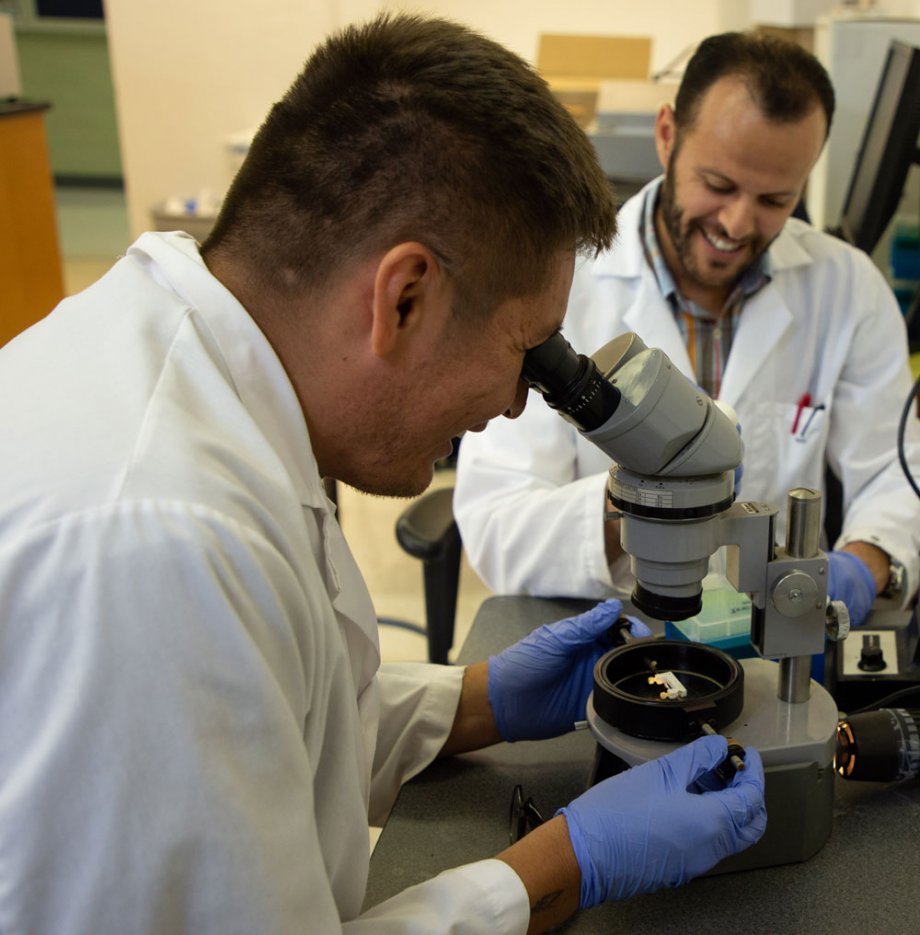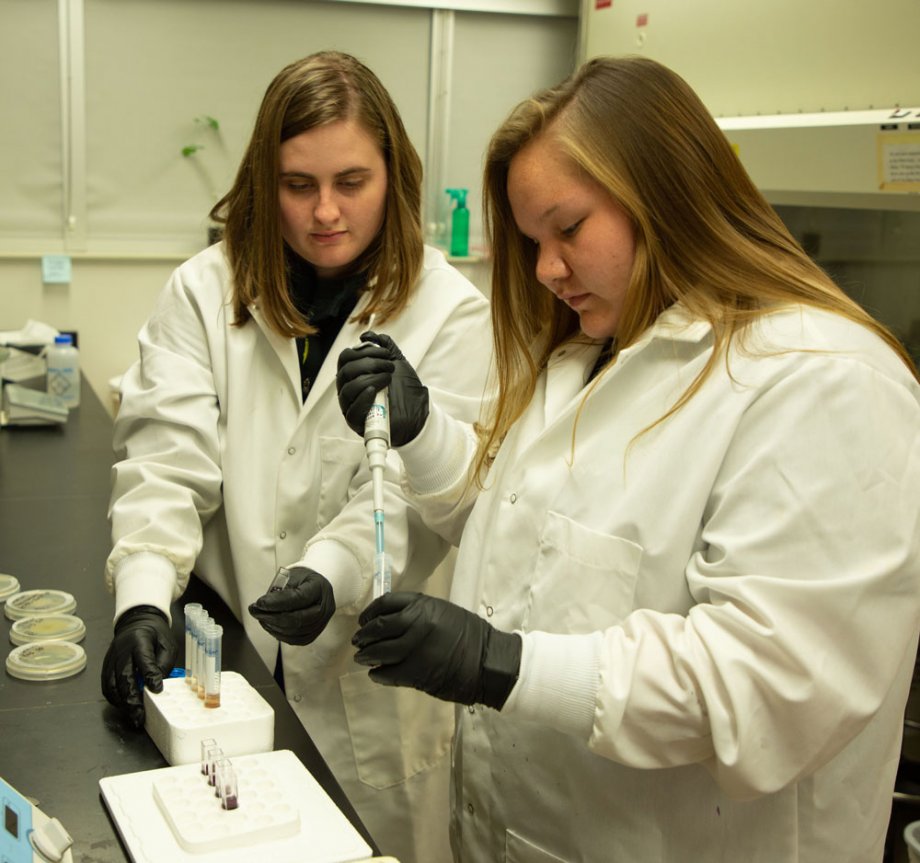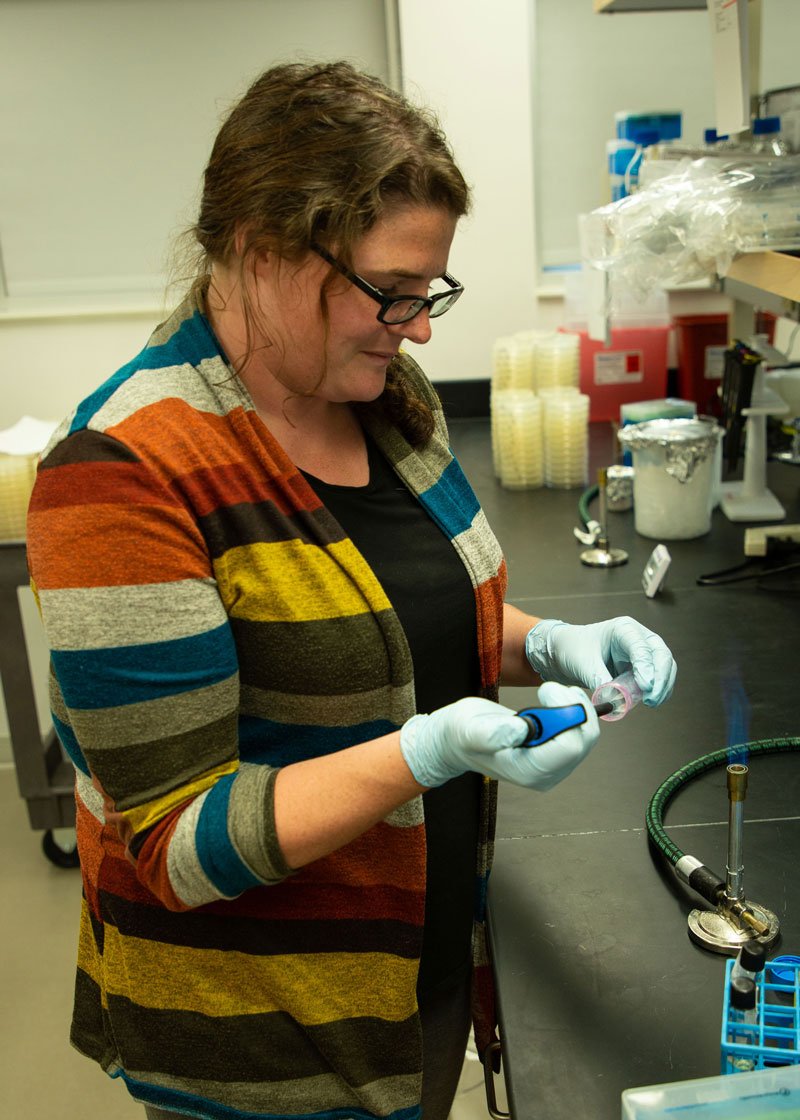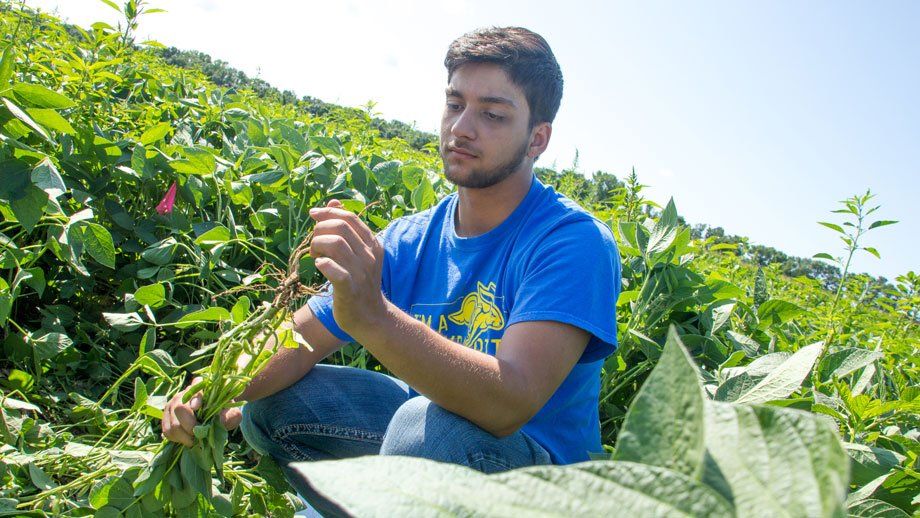“You can learn a lot here in a small amount of time.”
That sentiment expressed by Dillon Nelson, an Oglala Lakota College junior, typifies the experiences of five undergraduates who did research this summer at South Dakota State University through a National Institute of Food and Agriculture program.
The Future Agriculture and Science Taskforce Research and Extension Experiences for Undergraduates (FAST REEU) fellowship program provides qualifying students a 10-week laboratory experience the first summer, followed by an industry internship the second summer.
Associate Professor of Biology and Microbiology Madhav Nepal, who coordinates the program, said “We want to get our students excited about science and agriculture.” The program, which began this year, is supported by a four-year, nearly $280,000 U.S. Department of Agriculture grant and provides a $6,000 student stipend each summer.
Information about the FAST REEU program.
Working with seaweed extract

“It’s a good internship to do,” said Nelson. He worked with carrageenans, long chain sulfated polysaccharides, an extract of seaweed, under the mentorship of Assistant Professor Srinivas Janaswamy in Dairy and Food Science. The polysaccharides can be used to encapsulate nutraceuticals, vitamins, drugs, antimicrobials and flavoring in food products.
Nelson, guided by doctoral student Mohamad Elfaruk, purified the seaweed extract and prepared solutions to stretch oriented fibers. They added different ions and adjusted the drying time to enhance the fibers’ encapsulation capacity.
“Working with these tiny pieces takes lots of patience,” Elfaruk said. “Dillon was highly focused and interested in the research,” Janaswamy added.
“You need to be present,” Nelson said. “However, unlike with coursework, you can focus on one thing and it’s a lot more fun.” The Pine Ridge native will complete his bachelor’s degree in Indian law and an associate degree in pre-engineering at OLC next year. He plans on becoming a mechanical engineer.
“I would tell my peers to come experience the environment. Everyone here is uplifting and welcoming,” he said. “It’s a good place to be if you want to focus on your studies and education.”
Learning industrial microbiology

ShaTeal Pearman, a junior ag business major at SDSU, became more familiar with microscopes, plating and dilutions than she ever anticipated. The Eagle Butte native is a Lakota from the Cheyenne River Reservation. She learned about the FAST REEU fellowship from the American Indian Student Center.
“I got a glimpse of what really goes on in the lab,” said Pearman. Under the mentorship of Biology and Microbiology Research Assistant Bishnu Karki, Pearman worked on two projects. She helped master’s student Burgandy Roberts make dried distiller’s grain more digestible for fish feed and undergraduate biochemistry and biotechnology major Camille Massman extract antioxidants from the grape pomace left from making wine.
“ShaTeal is always asking questions about what we are doing and what the end goal is,” Massman said. Pearman, who wants to go to graduate school, said, “I feel everyone should get a chance to do this as an undergraduate.”
Studying antibiotic resistance

“FAST made me realize I need to figure out what I am doing after graduation,” said sophomore Caroline Kincade. The Minnesota native transferred to SDSU after two years in a vet tech program.
Kincade, who is in the Van D. and Barbara B. Fishback Honors College, is pursuing a microbiology major with a chemistry minor. She worked with doctoral student Heather Deter on a project to figure out how persister cells contribute to antibiotic resistance, under the mentorship of Assistant Biology and Microbiology Professor Nicolas Butzin.
“Doing research taught me a lot of patience,” she explained. “I have to think more about what I’m doing. In a lab class, we have a procedure. If the experiment does not work, we go on to the next. In research, we have to figure out why it did not work and redo it until it works. When we care about it, we want to learn more.”
Kincade has decided to combine veterinary medicine with microbiology. “This experience set me up for success,” she said.
Improving soybeans
SDSU sophomore Kaleb Parajuli, a wildlife fisheries major from Baltic, stretched his horizons by testing the effectiveness of two treatments designed to increase the soybeans’ nitrogen-fixing power. “I learned a lot working with vegetation in the field that I can use in terms of wildlife habitat,” he said.
“Kaleb is well organized and learned a lot about planning a relatively large experiment and collecting data,” said Parajuli’s faculty mentor, Associate Professor Senthil Subramanian. Parjuli also worked with Agronomy Field Specialists David Karki and Anthony Bly.
Parajuli measured chlorophyll and nitrogen content as well as leaf index weekly and counted the soybean nodules and calculated root, shoot and nodule biomass every three weeks. Graduate student Jesus Loya assisted him with the field work.
Parajuli recommended the fellowship to other students, saying, “Take the opportunity—you might discover something that can change your outlook.”
Immersed in parliamentary procedure
Wisconsin native Amie Carter had her high school chapter of the National Future Farmers of America Organization in mind when she chose assistant professors Troy White and Laura Hasselquist of the Department of Teaching, Learning and Leadership as her mentors. The junior ag education major at SDSU developed an interactive notebook on parliamentary procedures geared toward middle and high-school students.
“A self-evaluation this summer showed that my top five strengths fit into the component of parliamentary procedures,” Carter explained. “Doing this notebook was so much fun—and this is something I intend to use in my future classroom.”
White said, “Amie was passionate about her work.” At a summer conference, he showed Carter’s notebook to 10 to 15 teachers who gave her feedback. “They were excited about it,” he said. He’ll share it again at a conference this fall. Her notebook will also be available on Open PRAIRIE. “We will know whether it is being used,” he said.

Republishing
You may republish SDSU News Center articles for free, online or in print. Questions? Contact us at sdsu.news@sdstate.edu or 605-688-6161.

